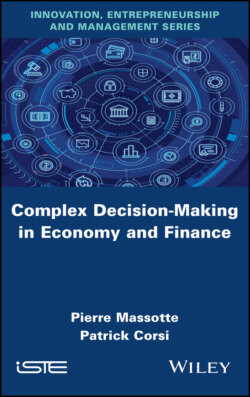Читать книгу Complex Decision-Making in Economy and Finance - Pierre Massotte - Страница 16
I.4.2. The role of intelligence
ОглавлениеWithin the complexity maelstrom of systems, the interactions and the autonomy of agents are involved, which help create new orders. We are often confronted with the consistency of these orders with respect to the expectations of managers, consumers, clients or owners of the system. The only problem here is related to the fact that we only take into account analytical intelligence, and we model and integrate it into the programs we develop. Of course, as already mentioned, improvements have been made with the inclusion of “common sense” knowledge (e.g. à la CYC – Cycorp (society)), but this is far from enough. Indeed, this form of intelligence is too systematic and cannot by itself account for an individual’s profound satisfaction, the adequacy of a solution, a social, professional or sentimental success, etc.
In fact, in our brain, with regard to Gardner’s works [GAR 06], intelligence is considered as an ability or aptitude to manage some human being functions. Thus, human beings possess nine different kinds of intelligence, in addition to the logico-mathematics (here above mentioned). Here, we will note nine of them:
1 1) musical-rhythmic (harmony, rhythm, equilibria, etc.);
2 2) visual-spatial (organization, geometry, hierarchy, architecture, etc.);
3 3) verbal-linguistic (manipulation of words and languages, concepts and semantics);
4 4) logical-mathematical (modeling, cognition, reasoning, etc.);
5 5) bodily-kinesthetic (control of motion, of physical expressions and actions);
6 6) interpersonal (emotional intelligence, psychological);
7 7) intrapersonal (empathy, ability of understanding the self; global and social strengths, interactions and weaknesses around us);
8 8) naturalistic (ecology and sustainable receptiveness, including ethical and holistic understanding of the world);
9 9) existential intelligence (related to consciousness and resilience: spiritual, moral, of deontology, ethics, etc., related to the concept of inclusivity and over-mind constructs).
All these types of intelligences lead to considering the so-called “smart” devices, oftentimes based on artificial intelligence programs. This book does not address artificial intelligence per se, as AI is but an enabling technology made to implement and automatize the different concepts and abilities relative to intelligence.
The example hereafter will introduce emotional (interpersonal) and social (intrapersonal) intelligence. It is indeed necessary to take into account a form of intelligence called “emotional intelligence”. It allows us to recognize, interpret, process and manage emotions, an essential concept for modeling and understanding the relationships between reason and passion, as well as the development of social relationships. As essential steps in a decision-making process [GRE 05b, DAM 05], emotion, reflection and reason are inseparable and it has often been shown that decisions taken “coldly”, in an “objective” manner and in the absence of emotion, sometimes turn out to be biased in relation to the objective pursued. In any decision-making process, it is important to be able to detect the profound feelings of partners, to discriminate against them and to anticipate events or consequences of actions to be taken according to their sensitivity, character and psychological state. This conditions the partner’s potential acceptance and adherence to the final choice or proposal for a decision.
With analytical intelligence, we manage information by bringing in knowledge and know-how while remaining in the objective field. With emotional intelligence, we rather manage emotions and feelings, by putting into play the notions of accomplishment and recognition: here we are in the subjective field.
Finally, and for the sake of completeness, it is necessary to mention social intelligence, which is the ability to perceive one’s inner motivations and behavior as well as those of others and to act accordingly. This should help us to become what we have chosen to become and it also allows us, in a group or network, to have access to agents where everyone is in harmony. Social intelligence is the ability of an individual or group of individuals to work in a group, to share values and to integrate into a common project. It is an indispensable criterion and a prerequisite for what we have discussed in the previous chapters, namely cooperation, from which collective intelligence emerges. Much work still needs to be done to take all these concepts into account in current decision support systems.
